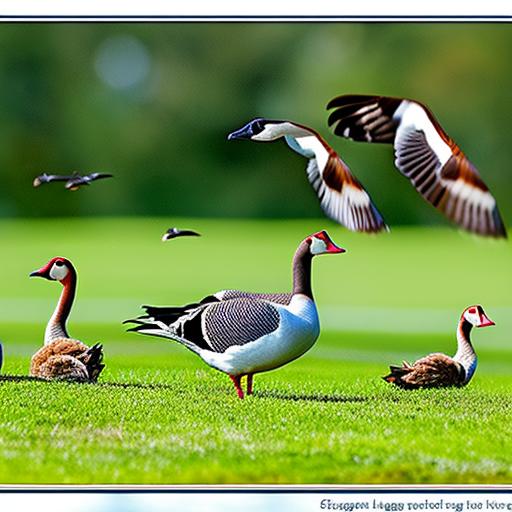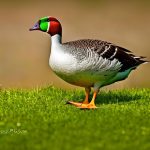Geese can be a beautiful sight to behold, but when they invade your lawn, they can quickly become a nuisance. Their droppings can make a mess of your property, and their constant grazing can damage plants and grass. If you’re dealing with a goose problem on your lawn, it’s important to find effective control methods to keep them at bay. In this post, we will explore different approaches to geese control, including physical barriers, chemical deterrents, motion-activated devices, natural repellents, sound-based deterrents, and maintaining a clean lawn. By understanding the behavior of geese and implementing these methods in a humane way, you can reclaim your lawn from these unwanted visitors.
Key Takeaways
- Geese are social animals that mate for life and are protective of their young.
- Common goose problems on your lawn include droppings, aggressive behavior, and damage to landscaping.
- Physical barriers like fences and netting can keep geese away from your lawn.
- Chemical deterrents like sprays and repellents can be effective in repelling geese.
- Motion-activated devices like sprinklers and noisemakers can scare geese away from your lawn.
Understanding the Behavior of Geese
To effectively control geese on your lawn, it’s important to understand their habits and behavior. Geese are social animals that often travel in flocks. They are attracted to open spaces with easy access to water and food sources. Lawns provide an ideal grazing area for geese, as they can easily find grass and plants to eat. Geese are also known for their territorial behavior and will defend their nesting sites aggressively. Understanding these behaviors is crucial in developing effective control methods.
Identifying Common Goose Problems on Your Lawn
Before implementing any control methods, it’s important to identify the common problems that geese cause on lawns. One of the most obvious issues is the accumulation of droppings. Goose droppings not only make your lawn unsightly but can also pose health risks as they may contain bacteria and parasites. Geese also graze on grass and plants, which can lead to damage and bare patches on your lawn. Additionally, their aggressive behavior during nesting season can be a safety concern for humans and pets.
To assess the severity of the goose problem on your lawn, look for signs of heavy grazing or damage to plants, as well as the presence of droppings. If you notice a large number of geese or signs of nesting, it’s important to take action to prevent further damage.
Creating a Physical Barrier to Keep Geese Away
One effective method of geese control is the use of physical barriers. Fences or netting can be installed to keep geese off your lawn. The height of the fence should be at least three feet to prevent geese from jumping over it. Make sure the fence is securely anchored to the ground to prevent geese from slipping underneath. Netting can be used to cover plants or areas where geese tend to congregate.
Maintaining these physical barriers is crucial for their effectiveness. Regularly inspect the fence or netting for any damage and repair it promptly. Additionally, make sure there are no gaps or openings that geese can exploit. By creating a physical barrier, you can effectively keep geese away from your lawn.
Using Chemical Deterrents to Repel Geese
Chemical deterrents can also be used to repel geese from your lawn. There are sprays and granules available on the market that emit an odor that geese find unpleasant. These products are typically made from natural ingredients and are safe for use around humans and pets.
To use these products effectively, follow the instructions provided by the manufacturer. Apply the spray or granules in areas where geese tend to congregate or graze. Reapply as needed, especially after rain or heavy watering. It’s important to note that chemical deterrents may need to be reapplied regularly to maintain their effectiveness.
Installing Motion-Activated Devices to Scare Geese

Motion-activated devices can be an effective way to scare geese away from your lawn. These devices use sensors to detect movement and then emit a loud noise, spray water, or create other startling effects. Sprinklers that activate when geese approach can be particularly effective, as geese dislike water and will quickly retreat.
When installing motion-activated devices, place them strategically in areas where geese tend to congregate or graze. Make sure the devices are properly calibrated to detect geese and activate at the right time. Regularly check the batteries or power source to ensure the devices are functioning properly.
Planting Natural Repellents to Keep Geese at Bay
Certain plants and herbs can act as natural repellents to keep geese away from your lawn. Geese have a strong sense of smell and are deterred by certain scents. Planting these repellents around your lawn can help discourage geese from settling in.
Some plants that are known to repel geese include tall grasses, such as switchgrass or fountain grass, as well as aromatic herbs like lavender or rosemary. Plant these repellents in areas where geese tend to congregate or graze. Regularly maintain and prune these plants to ensure their effectiveness.
Maintaining a Clean and Tidy Lawn to Discourage Geese
Keeping your lawn clean and tidy is an important step in discouraging geese from settling in. Geese are attracted to lawns with easy access to food sources, so removing any fallen fruits or seeds can help deter them. Regularly mow your lawn and remove any debris or clutter that may attract geese.
One of the main attractions for geese is the availability of water sources. If you have a pond or water feature on your property, consider installing a fountain or aerator to create movement and discourage geese from landing.
Regularly dispose of goose droppings by scooping them up and placing them in sealed bags for proper disposal. Avoid using a hose to wash away droppings, as this can spread bacteria and parasites.
Implementing Sound-Based Deterrents to Keep Geese Away
Sound-based deterrents can be an effective way to keep geese away from your lawn. Ultrasonic devices emit high-frequency sounds that are unpleasant to geese but inaudible to humans. Recordings of predator calls, such as those of hawks or eagles, can also be used to scare geese away.
When using sound-based deterrents, place them strategically in areas where geese tend to congregate or graze. Follow the instructions provided by the manufacturer for proper installation and use. Regularly check the batteries or power source to ensure the devices are functioning properly.
Seeking Professional Help to Solve Goose Problems
If you’ve tried various methods and are still struggling with a goose problem on your lawn, it may be necessary to seek professional help. Pest control companies or wildlife experts have the knowledge and experience to effectively deal with geese infestations.
When choosing a professional, make sure they have experience in dealing with geese specifically. They should be able to assess the severity of the problem and recommend appropriate control methods. It’s important to choose a professional who uses humane methods and prioritizes the well-being of the geese.
Adopting a Humane Approach to Geese Control on Your Lawn
It’s important to adopt a humane approach when implementing geese control methods on your lawn. Geese are living creatures that deserve respect and should not be harmed unnecessarily. By using the methods discussed in this post, you can effectively deter geese without causing them harm.
When using physical barriers, chemical deterrents, motion-activated devices, or sound-based deterrents, make sure they are used in a way that does not cause unnecessary stress or harm to the geese. Regularly assess the effectiveness of these methods and adjust as needed.
Dealing with a goose problem on your lawn can be frustrating, but by understanding their behavior and implementing effective control methods, you can reclaim your space. Physical barriers, chemical deterrents, motion-activated devices, natural repellents, maintaining a clean lawn, sound-based deterrents, and seeking professional help are all viable options to consider. It’s important to try different methods and find what works best for your situation. By adopting a humane approach, you can effectively control geese on your lawn while respecting their well-being.
If you’re looking for ways to keep geese off your lawn, you might also be interested in learning how to care for goslings. Goslings are young geese that require special attention and care. This article on Poultry Wizard provides valuable insights and tips on how to properly care for goslings, ensuring their health and well-being. Check out the article here to discover the best practices for raising these adorable creatures.
FAQs
What are some common reasons why geese come onto lawns?
Geese are attracted to lawns because they provide a source of food, water, and shelter. Lawns are often lush and green, which makes them an ideal grazing area for geese. Additionally, geese are drawn to bodies of water, such as ponds or lakes, which are often found on or near lawns.
What are some effective ways to keep geese off my lawn?
There are several effective ways to keep geese off your lawn, including using decoys, installing fencing, using repellents, and modifying the landscape. Decoys, such as fake predators or other animals, can scare geese away. Fencing can prevent geese from accessing your lawn altogether. Repellents, such as sprays or noise makers, can also deter geese. Modifying the landscape by removing water sources or planting unappealing vegetation can also discourage geese from visiting.
Are there any humane ways to keep geese off my lawn?
Yes, there are several humane ways to keep geese off your lawn. Using decoys or repellents that do not harm the geese, such as noise makers or sprays, can be effective. Additionally, modifying the landscape by planting unappealing vegetation or removing water sources can discourage geese without causing harm.
Is it legal to harm or kill geese to keep them off my lawn?
No, it is not legal to harm or kill geese to keep them off your lawn. Geese are protected under federal law, and harming or killing them can result in fines or other legal consequences. It is important to use humane methods to deter geese from your lawn.
What should I do if geese continue to come onto my lawn despite my efforts?
If geese continue to come onto your lawn despite your efforts, it may be necessary to seek professional help. Wildlife control experts can provide additional advice and assistance in deterring geese from your property. Additionally, contacting local authorities or wildlife agencies can provide further guidance on how to handle the situation.
Meet Walter, the feathered-friend fanatic of Florida! Nestled in the sunshine state, Walter struts through life with his feathered companions, clucking his way to happiness. With a coop that’s fancier than a five-star hotel, he’s the Don Juan of the chicken world. When he’s not teaching his hens to do the cha-cha, you’ll find him in a heated debate with his prized rooster, Sir Clucks-a-Lot. Walter’s poultry passion is no yolk; he’s the sunny-side-up guy you never knew you needed in your flock of friends!







